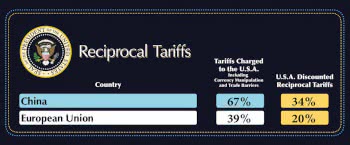
Donald Trump's muscular policy applied in all
directorates since the beginning of his second term as President of the United States
of last January 20, much more impetuous than the one
conducted in its first four-year term launched on 20 January
2017, led yesterday to the long-awaited and feared announcement
the introduction of tariffs that the US Federal Administration
set at least 10% and which, as highlighted in the
scoreboard presented yesterday by Trump, are much more
substantial for what the White House currently identifies as

the main commercial enemies of the United States: China, against which the
U.S. federal government will apply "tariffs
reciprocal" equal to 35% compared to duties imposed by the
including the effects of barriers and distortions
commercial which, according to the US administration, would reach the
67%, and the European Union, punished with reciprocal duties of 20% against
of tariffs and trade charges applied by the EU to the
US estimated at 39%.
An impetuous trade policy that threatens to bury the
multilateral system and create unpredictability and uncertainty
which are the real enemies of world trade. This is
the reaction of the International Chamber of Commerce to the announcement of the
levels of tariffs that will be applied by the United States: "that
we have witnessed today - said in the past few hours the
Secretary General, John W.H. Denton, on behalf of the more than 45 million
of companies from more than 170 countries represented by the Chamber
of International Trade - represents a watershed moment
in American trade policy, which poses serious risks to the
Downside for the global economy. To put all this into a
historical context, the effective tariffs of the United States -
explained Denton - now stand at a level never seen by
30s and cover a significantly higher share of the
American GDP compared to the infamous Smoot-Hawley Act," he said.
specified referring to the 1930 law that introduced very high
High.
"This - underlined the secretary
general of the ICC - is, without a doubt, a shock to the system
global trade, but does not necessarily have to result in a
systemic crisis. The United States is an economic superpower, but
they account for only 13% of global imports. The way in which
the other nations will respond to the new tariffs will determine in
last analysis the scope and depth of any
economic fallout of "Liberation Day"",
noted Denton referring to how Trump marked the day
of his reinstatement to the White House and that the president
American reused yesterday also to distinguish another
a day that he considers of historic significance.
Denton highlighted that the International Chamber of Commerce
continues to encourage governments 'to emphasise the
Maximum possible measure on negotiations and de-escalation:
tariff reprisals - warned Denton - are a game in
to which everyone loses".
"In the first instance," he continued, "we are concerned about
the potential impact of the significant tariffs imposed on a number of
emerging economies, an approach that risks damaging
development prospects of countries that are already
facing a worsening of trading conditions. The
companies in our network will urgently seek clarification from the
relevant US authorities on how they will be applied
in practice, the new tariffs at national level, including the way in which the
where they interact with industry-specific duties and requirements
of the rules of origin. Given the almost immediate entry into force
of the new measures, there is a clear risk - he explained
Denton - costly supply chain and flow disruptions
customs in the absence of a precise guide provided in a
timely".
"From a broader perspective
- concluded Denton - it is clear that the measures announced today
present a crucial challenge to trade governance based on
on the rules. In addition to responding bilaterally to the administration
We also need governments to take measures
to safeguard the multilateral system and lay the foundations for the
its possible revitalization. Predictability and certainty are
fundamental for cross-border trade. Understand
the US Administration's desire to
Ensuring a level playing field for trade
but we remain deeply sceptical that
tariff escalation of this magnitude can reach such a
Objective: Eventually, multilateral solutions will be needed to
solving long-standing inefficiencies and inequalities in the system
global trade".